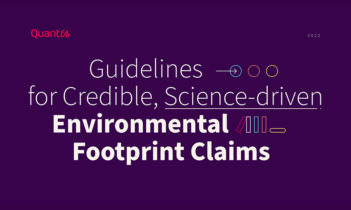
When it comes to preventing greenwashing and driving sustainable business transformation, CMOs and marketing teams have a critical role to play.
Marketing plays a tremendous role in building new markets, creating demand and shaping perceptions, making marketing teams a key player in driving both sustainable business transformation and shifts in mindsets and behavior. CMOs, more so than most leaders, are keenly aware of this power, but with great power comes great responsibility.
Amidst an ever-growing landscape of regulations, cries for corporate accountability and public hyper-vigilance around greenwashing, navigating the world of sustainability communications and marketing can feel a bit like walking through a dog park without shoes. Few campaigns have managed to strike the right balance. Yet keeping mum can tear down a brand’s carefully constructed reputation just as quickly as a greenwashing charge.
So, what can CMOs do to protect brand reputation while shaking up the status quo? Integrate a sustainability-savvy mindset into your department’s culture. Here’s how.
Greenwashing and greenhushing: navigating the landscape of sustainability communications
Central to the challenges marketers face when communicating their organization’s sustainability progress — or a product’s sustainability attributes — is the practice of greenwashing. It’s surprisingly easy to do, whether deliberately or accidentally. At the opposite extreme, fear of saying the wrong thing may end in saying nothing of substance or, quite simply, nothing at all. Let’s start by exploring these concepts.
Greenwashing
Greenwashing is when a company exaggerates its environmental credentials by portraying (or intimating) itself — or its products — as sustainable without taking the actions that would justify the claim or without properly substantiating a claim. And it’s more prevalent than you might think.
Differentiating “greenwashing by design” vs. “greenwashing by accident” is nuanced since most everything a marketing professional does is done with some level of intent. The difference is in the level of awareness.
Greenwashing by design
Willfully and consciously cherry-picking positive attributes over negative impacts, exaggerating claims, or omitting/hiding important information is the textbook definition of greenwashing by design. Of course, the marketer indulging in this behavior may not think of it as greenwashing in the moment: it just might have sounded better at the time.
Greenwashing by accident
By parroting or developing unvetted, or imprecise messaging, marketers may unknowingly be greenwashing. They may believe their claims to be true because they’re either going solely on what they were told or are ignorant to the factors that would make them false. For CMOs, this increases the importance of understanding not only the authenticity of their companies’ sustainability efforts, but the nuanced nature of them.
What you don’t know can hurt you
Greenwashing not only hurts consumers, but it also hurts brands in the long run. Like grass stains on white linen, greenwashing — intentional or not — creates a stain on your company reputation that’s tough to get out and move past.
Imagine your US company offers a new cholesterol-friendly plant-based alternative for butter. You’ve done the math and your product, inclusive of distribution, has a substantially lower environmental impact than its dairy counterpart. You’re so proud of this fact, you make it central to your messaging.
Now imagine that your company is hugely successful, people love the product because it tastes great, it’s healthy and it has a smaller environmental footprint. An expansion to Europe is planned.
Your team eagerly translates the central messaging extolling the same virtues to the major European languages and launch — more or less — the same campaigns that worked in the US. In each market, there’s huge backlash with charges of greenwashing. What went wrong?
Though nothing got lost in translation, it did get lost in transportation. It didn’t occur to anyone that the environmental footprint of the product changes considerably once shipped overseas. The added emissions from transporting your product a greater distance actually overtook any benefit from the cattle-free production. This, of course, amounts to a false claim (however inadvertent).
One could maintain that the marketers should have known better, but when it comes down to it, the various cultural mechanisms may not have been in place to ever question it. It’s likely that the marketer didn’t know the first thing about what was behind the initial claim. It may seem like common sense, but “common” suggests a degree of basic knowledge.
Greenhushing
On the other end of the sustainability communications spectrum is greenhushing — when companies under-communicate or refuse to communicate about their sustainability activities. There are a few reasons a company might do this.
- They’re worried about greenwashing accusations. Heightened public awareness and increasing regulations are putting brands under more scrutiny than ever. One misstep could mean irreparable damage to a brand’s reputation or litigation.
- Sustainability targets are now the standard, rather than the exception. Incremental, underwhelming or irrelevant changes don’t make for good storytelling. If your company’s sustainability efforts are focused on “doing less bad” or are unrelated to its value proposition, it’s going to be hard to shape an impactful communication that builds trust and wins over hearts and minds.
- In talking about what they are doing, companies may reveal what they aren’t doing. Companies fear they aren’t doing enough — and they might be called out on it — or that they would be perceived as not walking the talk.
- Some are concerned that marketing products as more sustainable might backfire because some consumers still perceive “environmentally conscious” products as less effective or having other tradeoffs.
But radio silence presents its own problems. Greenhushing could make companies come off as out of touch, aloof or oblivious. It could also slow progress on sustainability. Communicating about sustainability efforts can help establish sustainability norms, creating market pressures that spur other organizations, actors along the value chain and even consumers to action. Further, greenhushing could slow the expansion of sustainability norms in regions where they aren’t well-established.
Trust is on the line
It should come as no surprise that consumers have trust issues. Buzz terms like “green,” “carbon neutral,” or “net-zero” may generate excitement at first, but it’s clear that they don’t add up. If so many companies are “net zero,” why aren’t we seeing more progress? The climate emergency, biodiversity loss, water scarcity and soil degradation challenges our planet faces continue to mount. Communications that once stoked optimism with the consumer now drive cynicism. It’s becoming increasingly difficult for the companies truly doing the work to tell their stories when terms that should be positive are diminished from misuse.
CMOs shouldn’t lose sight of the fact that consumer distrust has a real cost to companies. A recent Harvard Business Review article, posits that “companies that are perceived to be greenwashing suffer, on average, a 1.34% drop in their ACSI customer satisfaction score.” This isn’t as insignificant as it might sound on the surface as “even small changes in a firm’s customer satisfaction score can have significant implications for corporate performance. A change of merely one unit in customer satisfaction (as measured by ACSI) has been estimated to result in 0.032 units of change in net earnings per share (EPS) and 0.40 units of change in return on investment (ROI).”
Though it could be argued that widespread greenwashing will stop when customers care enough to parlay their cynicism into their buying behavior, the issue is getting enough attention in the media where regulators are taking notice. A UN Report released at COP 27 underscored the problem of greenwashing and made some common-sense recommendations, such as substantiating claims by using IPCC or IEA targets to represent “a fair share of the needed global climate mitigation effort.”
As far as what may come of those recommendations remains to be seen, but companies can expect more scrutiny, if not from regulators, from NGOs and their own customer base.
5 essential ways CMOs can prevent greenwashing
It’s important to acknowledge the elephant in the room: conventional marketing wisdom may not work in the realm of environmental sustainability. In fact, it may be the source of the problem.
Accentuating the positive and downplaying the negative is second nature to any marketer. Unfortunately, this mindset is at odds with honest, credible communications — which are critical for sustainability. CMOs need to urge their teams to take a different approach inclusive of a change in culture and mindset. Here are some critical actions that CMOs can encourage their teams to take to achieve this:
-
- Integrate sustainability into professional development plans. Ensure marketing teams have a basic understanding of environmental sustainability and the company’s impact. Prioritize a clear understanding of the facts to make authentic messaging second-nature. Don’t hesitate to ask deep, difficult questions — better to do so before your critics and customers do. If traditional ways of operating and established business models appear green at first blush, ask tougher questions. Are there behaviors that undermine or are at odds with sustainability efforts and goals? What are your targets, and how did you derive them?
- Validate and substantiate claims as a matter of departmental policy. When it comes to communicating around sustainability, less is not more — and the risks of getting it wrong are colossal. A CMO’s brand will lose all credibility if it makes a claim without sharing sources and educational material. Develop the needed governance and set the best practices. For more information, check out our “Environmental Footprint Claims Guidance.”
- Get (the right kind of) help to communicate responsibly. Internal teams aren’t the only ones that need to be up-to-speed and equipped with the appropriate capabilities to communicate credibly about your company’s sustainability efforts — your external partners need to be on the same page too. If your go-to agency lacks sufficient expertise or understanding to articulate your sustainability efforts, it could introduce another risk variable. Find a partner with enough expertise to challenge your team, ask the right questions and point out any blind spots.
- Push for action. Marketing teams have a natural, vested interest in how their companies are perceived by the public. In this way, they are armed with a powerful, single-minded business case for change: the health of the brand demands it. The best stories are those of substance. True and direct actions will win your brand favor and it’s critical that’s understood within every corner of the company.
- Lean into the journey. Be transparent about where you are, where you’re going and (to the extent possible) how you’ll get there. Don’t risk your reputation by portraying false progress (let alone perfection). If your company didn’t meet the targets set, make it ok to say so. Your company wouldn’t decide not to report revenues if earnings fell short of expectations, why should sustainability reporting be any different?
There’s more to do
Credible communications are just one of a number of ways the CMO can make an instrumental contribution to their organization’s sustainability efforts. There are opportunities across the marketing mix (price, promotion, placement and product) to drive more sustainable practices for company and customer.
Moreover, your efforts can accelerate change simply because it’s a helpful reminder that the customer really is watching. That can stoke the motivation to build on your success across the organization. Before you know it, you may find that sustainability — the real and honest kind — is central to your brand identity.
Latest resources
 Report
Report By Quantis
Guidelines for credible, science-driven environmental footprint claims
Quantis’ “Guidelines for credible, science-driven environmental footprint claims” provides companies with best practices and recommendations to credibly communicate about their sustainability efforts and the impact...

COP15’s massive moment for nature: What business needs to know about...
After two weeks of intense and often fractious negotiations at COP15, a new Global Biodiversity Framework finally emerged.

EU adopts historic agreement to achieve it climate objectives
The landmark deal drives substantial carbon market reforms.



